Interfaith Books |
If you wish to purchase any of these books, click on either the title or the book cover to be directed to Amazon.com. As a warning, I have put up pictures of the book covers to give you somewhat an idea of the style of each book (I know, I know. "Don't judge a book by its cover") so the pages may load slowly, depending on the speed of your internet connection.
If this page came up without frames, Click here to see the complete "Books for Jewish Children" website
Other Pages of Interest:
Easy Reader and Picture Books:
Jewish Children's Books (General) |
Jewish Board Books |
Biblical Stories for Children |
Jewish Holiday Books |
Jewish Family Cookbooks |
Folktales and Talmudic Stories for Children |
Jewish Life Books (Mitzvot, Keeping Kosher, etc.) |
Jewish Life Cycle Books |
Family Haggadahs |
Children's Prayerbooks |
Introductory Hebrew Books |
Jewish History and Historical Fiction Picture Books |
Israel Books
Middle School and YA Books:
Bar Mitzvah Books |
Jewish Fiction |
Historical Fiction |
Torah Study |
Prayer and Jewish Life Books |
Jewish Holidays |
Jewish Biographies |
Jewish History Books |
Holocaust Books for Teens |
Israel Books
Jewish Books for Children |
Bar Mitzvah Books |
Jewish Parenting Books |
Jewish Music for Children |
Jewish Videos |
Jewish Toys and Gifts |
Jewish Gift Baskets and Gourmet Food |
Jewish Jewelry |
Amazon.com Coupons, Promotions, and Sales
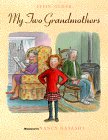
My Two Grandmothers
By Effin Older
A warm story about old and new traditions in a mixed religion family.
Lily loves spending time with her Grammy Lane, riding tractors in the summer
and snowshoeing in the winter. She loves playing golf and going to the
clubhouse with her Bubbe Silver. And she especially loves the holidays --
X-mas with Grammy and Hanukkah with Bubbe. There are Lane family traditions.
And there are Silver family traditions. But Lily wishes she could share a
tradition with both of her grandmothers. Maybe it's time to start a new
one....
Description from Publisher
Lily has two grandmothers, Bubbe Silver and Grammy Lane. She loves to visit Bubbe Silver in her tall apartment building where they play golf and drink colored drinks in the clubhouse. She loves to visit Grammy Lane on the farm where they ride tractors and play in the snow. But Lily especially loves spending time with her two grandmothers during the December holidays. She eats gefilte fish (with extra hot horseradish) and latkes and lights the candles with Bubbe Silver for Hanukkah. She eats fudge and pie and sings carols with Grammy Lane for Christmas. Both grandmothers tell Lily about their own traditions. But Lily figures out a way to combine the two to create a new tradition. Warm illustrations show the warmth associated with both grandmothers. Children will love the combination of new and old traditions in an interfaith family.
Lori's Description
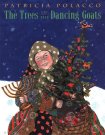
The Trees of the Dancing Goats
By Patricia Polacco
Another lovely autobiographical snippet from Polacco. The story centers around Trisha
and her family as they make loving preparations for Hanukkah, especially her Grampa,
who carves wooden toys for the children for each day of the Festival of Lights. When
several families in their farm community come down with scarlet fever, Grampa and
Babushka realize that their neighbors won't be able to celebrate their holiday properly
and take Christmas trees and baskets of food to them. The blending of the two holidays
is touching and heartfelt. Polacco's warmly detailed illustrations enrich this tender tale
about the true nature of giving, of being good neighbors, and of celebration
Description from School Library Journal
Polacco's characteristically buoyant illustrations embody the joy of holiday traditions
even as her robust storytelling locates the essence of that joy in sharing and friendship.
While this work should have broad appeal, it is in particular an excellent choice for
families seeking to mingle Jewish and Christian traditions.
Description from Publisher's Weekly
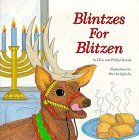
Blintzes for Blitzen
This charming tale of X-mas and Hanukkah comes alive with a newly released cassette.
Listen and read along as Blitzen wanders off from Santa and the other reindeer, and finds
himself celebrating Hanukkah with Bernie the Deli owner, and his family, reknowned
throughout town for their delicious mouthwatering blintzes.
Description from Publisher
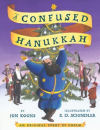
A Confused Hanukkah: An Original Story of Chelm
By Jon Koons
Hanukkah is fast approaching in the village of Chelm, but the Rabbi is away. Unfortunately, not one of the villagers remembers how Hanukkah is supposed to be celebrated. So they send Yossel, a simple young man, to the neighboring village to learn what he can. Yossel makes a wrong turn, but he does find some people celebrating a holiday. The question is: Is it the right holiday?
This original story, based on the legendary town of fools, is perfect for interfaith families and anyone looking for a good chuckle at holiday time.
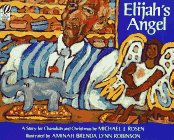
Elijah's Angel :
A Story for Chanukah and Christmas
By Michael J. Rosen
Michael J. Rosen addresses racial and religious tolerance as well as friendship across the generations in this picture book loosely based on the life of Elijah Pierce (1892-1984). Michael, a Jewish fourth-grader, befriends Elijah, an elderly African-American Christian after a class trip to his barber shop. Michael loves Elijah's wood carvings, but is afraid to bring them home because his parents may think they are graven images. On Christmas Eve (which also happened to be the first night of Chanukah), Elijah gives Michael a carved guardian angel. Michael is afraid of his parents' reaction, but is surprised when they embrace the gift. "What this angel means to you, doesn't have to be what it means to Elijah," he is told. On Christmas Day, Michael and his family give Elijah a personal gift of their own: a Chanukah menorah. From then on, for each night of Chanukah, the menorah was lit in Elijah's window among the intricate woodcarvings. The fluid storytelling and bright, colorful drawings help bring home the message of friendship across races, religions, and generations. An excellent choice for reading-aloud.
Lori's Description
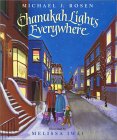
Chanukah Lights Everywhere
By Michael J. Rosen
One crescent moon glows in the sky. Two headlights shine through the window... On each magical night of Chanukah, a young boy and his sister count more lights shining all around them! Join them as they discover what it means to celebrate Chanukah in a world filled with so many other lights. And look carefully at each of Melissa Iwai's delightfully playful illustrations, in which an ever-growing number of cats and cleverly hidden objects serve as reminders of each day's joyous Chanukah celebration! This gentle and fun-filled exploration of the meaning of Chanukah reminds families everywhere that the warmth of the holiday extends far beyond the menorah.
Description from Publisher
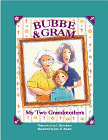
Bubbe & Gram :
My Two Grandmothers
By Joan C. Hawxhurst
Clearly directed at children in interfaith families, the fictional frame gets
across some information about Christianity and Judaism and shows a child
enriched by her bonds with her Jewish and Christian grandmothers. As in
Newman's Heather Has Two Mommies, the didacticism is heavy. Bubbe
tells her grandchild stories about Moses and the Maccabees. Gram tells her
grandchild stories about Jesus and recites the Lord's Prayer. Sometimes on
Shabbat, the child goes to temple with Bubbe, and afterwards, they light
candles, say blessings, and eat challah bread. Sometimes on Sunday, she goes
to church with Gram, and then they have a big midday dinner and say grace
before they eat. The alternating of the faiths from one page to another may
be a bit muddling for young children, especially since a lot is mentioned
but not developed, but the line-and-watercolor illustrations help distinguish
the two grandmothers and their traditions. The loving message is clear: this
child is lucky to have X-mas and Hanukkah, Passover and Easter, and
stories from everywhere.
Description from Booklist
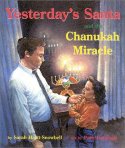
Yesterday's Santa and the Chanukah Miracle
By Sarah Hartt-Snowbell
Annie can't believe her eyes! The "Santa" in the mall looks so much like her grandfather's friend, Simon. A Jewish Santa? Annie lines up to get a closer look—and ends up "placing an order".
Simon Greenbaum, flat broke, has taken the job at the Winter Castle to earn a few dollars between jobs, he tells her. And after all, with his long white beard, he looks just like Santa already. "Don't breathe a word to your Zaideh that you saw me here," he says. "If you don't tell him that I'm a Santa Claus, I won't tell him what you asked for. It's a deal?"
When Annie's parents find out, however, that she has placed an order with Santa for a Christmas tree, they are disappointed and tell Annie that she must learn to be her own person and stand up for her own beliefs in order to earn the respect of others.
Meanwhile, Annie wants to help Mr. Greenbaum and comes up with a plan. But to carry out her plan, she must reveal his secret. What will she do? At the Chanukah meal that evening, Annie explains to her cousins that Mr. Greenbaum is out of work, and the children all agree to give him their Chanukah gelt, which they have just received. When Annie returns to the mall with the money the next day, she finds that Simon Greenbaum has been fired from his job for not being able to name Santa's reindeer, but, in what seems to be a miracle to Simon, he is given a job in Menswear instead. He is so happy that in an exchange of Chanukah gifts, Simon gives Annie some gelt and she gives him what she has collected.
This delightful picture book, illustrated beautifully by Patty Gallinger, is a story of acceptance, religious freedom and the act of giving (tzedakah). By combining the festivities of two holidays, Hartt-Snowbell teaches us a lesson in tolerance and charity which should appeal to any child six and up.
Description from Publisher
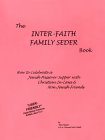
The Inter-Faith Family Seder Book
By Nan Meyer
Nan Meyer is to be congratulated! She has written a Haggadah with which Jewish families can welcome their non-Jewish friends and relatives to the Seder table. But in the process she has produced a Seder book that many Jews who have lost touch with but wish to return to their culture will find inviting to use. The Inter-Faith Family Seder Book is not only entirely user-friendly, it also provides practical suggestions for preparation and conduction of the Seder, and it gives the Seder service in a step-by-step, easy to follow sequence. In an era where Jews are becoming increasingly assimilated into the population, through both intermarriage and simple acculturation, it's easy to lose touch with their heritage. Getting back in touch with it can be difficult. However, this Haggadah can ease the retunr. It is very comfortable to use. It is in no way intimidating, the Hebrew that is used appropriately is also used sparingly, but in ways that are familiar. It is as appropriate to the ex-patriot Jews who wish to return as it is to non-Jews. Nan Meyer has made an important social contribution with her Haggadah.
Description from Amazon.com Customer Review
I originally wrote this book so that my Christian daughters-in-law would know what was going on and would be comfortable at our family's Seder table. As I worked I discovered that in traditional haggadahs (the manual used to direct the Seder), the Exodus tale was not told as much as referred to. So I set out to tell the story (as the Bible commands: "and you shall tell your child"). And, I incorporated in the telling all the facts we now know: i.e.: how long the Jews were in Egypt, the name of the pharaoh, etc. I also stripped away repetition (to do something once is meaningful; to do it two or more times is boring, especially to the children, and it's for them the story is told). I edited down long passages, and wrote and substituted songs wherever possible. Instead of reading about the troubles the Jews had in Egypt, I wrote the story to the tune of Old Man River which everyone sings. The Four Questions, which must be asked by the youngest person at the table, is set to the tune of Twinkle, Twinkle, Little Star ... which a four year old can learn, even if he doesn't or she doesn't have someone to teach the Hebrew version.
I also incorporated into the telling all the explanations we have been giving for years to our non-Jewish guests. The supper is meant to be a learning lesson about how the Jews left Egypt. In my book, it is told with songs, games and special foods. Friends heard about my project and had sent me the customs and materials used in their Seders. After the book was written and electronically published, I gave copies of it to my family and sent the contributing friends copies of my finished project. To my amazement, orders began to pour in. With 72% of Jews marrying out of faith, everyone was related to or knew of someone who would like to read The Inter-Faith Family Seder Book.
Description by the Author

The Interfaith Family Guidebook :
Practical Advice for Jewish and Christian Partners
by Joan C. Hawxhurst
What Happens When a Jew and a Christian Fall in Love?
Over one million Jewish/Christian couples in the United States face the challenges and opportunities inherent in their decision to marry. This balanced and open-minded book is the best comprehensive guide in print for families living with two faiths in one household. Concise and practical, The Interfaith Family Guidebook offers these families a look at the many questions they will face and the resources available to help them find their own answers.
This book will help interfaith couples to: respect and appreciate both of their religious heritages; discuss with candor the struggles they will face; celebrate all the holidays that are meaningful to them; consider the implications of their impending marriage; nurture positive relationships with their extended families; create a mutually satisfactory plan for celebrating in their home; decide how to raise their children; plan meaningful and inclusive ceremonies to mark their marriage, the birth of a child, coming-of-age, and other life-cycle events; learn from the experiences of other interfaith families; and find helpful local and national resources and support groups.
This book is your constant reference on the issues facing interfaith couples. Whether you are recently engaged or married with children, you will refer to it again and again, throughout your life together. And if you are a clergyperson, counselor, or therapist, you will want to recommend this book to all your interfaith couples.
Description from Publisher

Raising Your Jewish/Christian Child:
How Interfaith Parents Can Give Children the Best of Both Their Heritages
By Lee F. Gruzen
A new, updated edition of the "thoughtful and pioneering guide" (Library Journal) to the problems of blending both Jewish and Christian faiths into the lives of children of interfaith marriages. Based on hundreds of interviews, as well as the author's extensive research and personal experience, this highly praised book covers talking with children about God, planning ceremonies, celebrating holidays, relationships with grandparents, and developing a sense of self and belonging. Written with compassion and warmth, it offers a wealth of insight into the complicated feelings and loyalties that parents, children, grandparents, and clergy bring to the subject, and presents positively the options available to interfaith parents concerning religious training and rites of passage, drawing strengths from the two backgrounds. New to this edition are an updated resource section, featuring new online resources, updated statistics, a section on college students of interfaith marriages, the surge in creative new life-cycle ceremonies, and the growth of independent grassroots groups around the country.
Description from Publisher

How I Saved Hanukkah
By Amy Goldman Koss
Marla Feinstein, the only Jewish kid in her fourth-grade class, feels like an outsider--especially as everyone gears up for Christmas, including her best friend, Lucy. To make matters worse, her father is out of town, and her mother doesn't take Hanukkah seriously. The best she can hope for is a few candles, a couple of unwrapped gifts, and a dreidel that doesn't spin. Once Marla decides to find out what Hanukkah is really about, however, things turn around. Starting with a genuine dreidel game, her family begins to catch the spirit. Her mom even makes her first latkes (potato pancakes), which leads to a big Hanukkah party for all of their friends--Jewish and non-Jewish alike. A gem of a story, in which a child's persistent curiosity is the means for introducing readers to the background and traditions that make up a delightful holiday.
Description from Booklist
A Hanukkah to remember -- finally!
Marla Feinstein, the only Jewish kid in her fourth-grade class, knows what this holiday season will be like. While everyone else is decorating trees and hanging stockings, she'll be forgetting to light the candles and staring at a big plastic dreidel. But when Marla decides to learn what the Hanukkah traditions are really about, things change fast. Soon she's got her family turning latkes into Hanukkah Performance Art and doing a wild hora. And by the end of this funny and heartwarming novel, the Festival of Lights is the biggest party in town!
Description from Publisher
Hanukkah is fast approaching, but to fourth-grader Marla Feinstein, it doesn't seem like a very big deal. While all of her neighbors are festooning their houses with Christmas lights and decorations, Marla has to make do with a plain menorah, a plastic dreidel that won't spin, a mom who doesn't even wrap her Hanukkah presents, and a dad who is out of town on a business trip. With her friend Lucy, Maria embarks on a mission to make Hanukkah fun, and soon has her mother making latkes, her little brother winning at dreidel, and the whole neighborhood dancing the hora. The fun and breezy tone and affectionately drawn characters will appeal to readers who will find themselves learning a bit about the meaning of Hanukkah in the bargain. DeGroat's pen-and-ink illustrations complement this warm and funny story
Description from School Library Journal
While her classmates are given red and green paper to do their art projects, the substitute teacher gives Marla blue and white so she can make something for Hanukkah. Marla hates being singled out. What's more, she loves the way her best friend Lucy celebrates Christmas. Marla's mother had always downplayed Hanukkah. This year, Marla has lots of questions for her. With help from her little brother and her best friend, Marla is able to reawaken the joys of family tradition in her home. Her mother makes potato latkes, teaches them the hora, and gives a party for friends and neighbors. Middle grade readers will relate to Lucy and Marla's views of their families. They will enjoy the light-hearted approach to self-acceptance. The black and white line drawings show two friends enjoying each other's company and some symbols of the holidays.
Description from Children's Literature
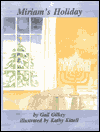
Miriam's Holiday
By Gail Gilkey
Miriam's holidays are different because her family consists of a Jewish father and a Christian mother. They celebrate both religions and Miriam explains why. Simple histories of Hanukkah and Christmas are given. This book offers young readers a diversity of traditons and shows how one American family keeps its faith. A 32 page paperback picture book for ages 3 to 10.
Description from Publisher
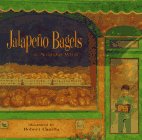
Jalapeno Bagels
By Natasha Wing
It's International Day at school, and Pablo wants to bring a treat from his
parents' panderia to share with his classmates. Should he bring his
mother's wonderful pan dulce or a challah, which his father has
shown him how to braid? What about his favorite chango bars or some of
the jalapeno bagels he and his parents make together? Pablo's final
choice isn't much of a surprise, but Wing's simple, affectionate portrait of
a mixed family should have wide general appeal and be of great interest to
grown-ups in search of good books that show ethnically diverse families.
Casilla's warm, glowing paintings capture the individuality of each character
with both subtlety and expression. A glossary of Spanish and Yiddish terms
(which have been italicized in the text) is an added bonus.
Description from Booklist
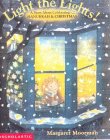
Light the Lights! :
A Story About Celebrating Hanukkah and Christmas
By Margaret Moorman
Interfaith families and families that aren't religious crave materials that
validate the observance of holidays from the traditions of different faiths.
In one of a very few such picture books, Moorman focuses on a household's
joyous celebrations of Hanukkah and Christmas, two festivals that frequently
occur close together on the wintertime calendar. The book's title reflects a
motif common to both: candles in a menorah glow brightly in Emma's house
during the eight days of the Jewish holiday; later, lights shimmer beautifully
from her family's Christmas tree. The family's celebrations are purely secular,
and Emma's response to everything--be it getting presents or playing dreidel--
is sheer delight, which Moorman captures nicely in her bright, unpretentious
paintings.
Description from Booklist
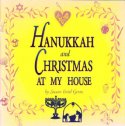
Hanukkah and Christmas at My House
By Susan Enid Gertz
This book is very good for young children of an interfaith family. It explains it in the way of the mother being Jewish and the father being Catholic. It shows the excitement that each parent had growing up and facts on each religion. It gives good explanations of Christmas and Hannukah - but beware, if you are not that religious and are looking for something very generic like about opening presents, it is not like that. It goes into short explanations of the Maccabees and of Mary and Joseph. Overall - a good start to explaining to kids and having respect and knowledge of both religions.
Description from Amazon.com Customer Review
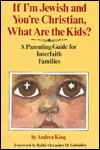
If I'm Jewish and You're Christian, What Are the Kids? :
A Parenting Guide for Interfaith Families
By Andrea King
Perhaps the most difficult decision parents in an interfaith family must make is choosing a religious identity for their children. In this book, early childhood expert Andrea King tracks the development of two composite families through the life-cycle process and compares how well they manage the challenges that arise at each stage.
Description from Publisher
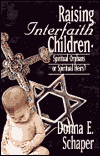
Raising Interfaith Children :
Spiritual Orphans or Spiritual Heirs?
By Donna E. Schaper
Schaper isn't just a Christian woman who married a Jewish man; she is also an ordained Protestant minister. From the beginning, Schaper and her husband decided that their children would be raised in both religions. Consequently, the children attended Christian churches for the first years of their lives, until it was time for them to begin training for their bar and bat mitzvahs. Shaper's account of the family's experiences isn't really a "how-to" about raising an interfaith family, although there is some of that. Much more, the book brings together Schaper's philosophical musings on different aspects of the idea of interfaith living: the ways that God is represented in the community and in the lives of each person; the feelings that intermarriage generates in the participants and their families; and how fundamentalism in all faiths collides with the acceptance required in intermarriage. Schaper's message, most of all, is one of support. Her belief in the power of love is powerful in itself, and despite doubts, missteps, and even fear, she is sure that inclusion is always the better path than polarization. Although the writing is at times repetitive, it is also honest, heartfelt, and comforting. A strong choice for libraries who serve interfaith families.
Description from Booklist

Keys to Interfaith Parenting
By Iris M. Yob
Here's help for parents who must cope with the details of raising children in the often-demanding contemporary environment. Families in which parents have different religious faiths are more common than ever today. Here is advice on raising happy, well-adjusted children in such surroundings, as well as informed discussion of both the strengths and potential problems typical among interfaith families.
Description from Publisher
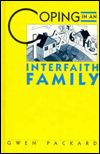
Coping in an Interfaith Family
By Gwen K. Packard
Questions of religious identity, relationships between family and friends, or conversion can be difficult for anyone, but especially for teens who want nothing more than to conform and be "normal."
Description from Publisher
Packard quotes extensively from interviews with interfaith couples and their children to give concrete examples of the issues and problems they face. After discussing the trend toward more interfaith unions and policies of various religions toward intermarriage, she explores how families practice their faiths, how parents and children cope with religious holidays, the choice of conversion or maintaining separate faiths, the reaction of parents, and the problematic and positive effects of experiencing two different religions within a home. The use of interviews makes the text interesting and lively to read; however, as various people are quoted numerous times, it gets a bit repetitive. The book may be of interest to teens dating someone of another faith as it points out some of the issues they may have to face and shows the process by which parents work out their problems in the family. A list of resource organizations and suggested fiction and nonfiction for further reading add to its usefulness.
Description from School Library Journal

Sharon, Lois & Bram's Elephant Show: Candles Snow & Mistletoe

Our kids love Sharon Lois and Bram, but we were unprepared for the quality and repeat viewing aspects of this wonderful Christmas special - and it's probably the only Christmas Special ever made that has a gorgeous Chanakah song in it! The singing and music is great, the choreography is sophisticated and the comedy is first class.
Description from Amazon.com Customer Review
Companion CD Also Available
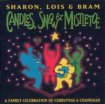
Sharon, Lois & Bram's Elephant Show: Candles Snow & Mistletoe
(CD)
A delightful mix of Hanukkah songs, Christmas songs and winter celebration songs. "The popular Canadian vocal trio has assembled a holiday album crackling with freshly roasted chestnuts and some spunky new material. The group is careful to include songs that celebrate both Christmas and Hanukkah, as well as to give an international flavor to standards such as The Twelve Days of Christmas."
Description from The Chicago Sun Times
A family celebration of Christmas and Chanukah! Lyrics to many (but not all) of the songs included, plus recipes, too!
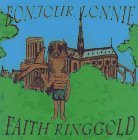
Bonjour, Lonnie
By Faith Ringgold
The Caldecott award-winning author tells about an African American experience rarely presented to children. Lonnie's story is about his search for his heritage. It tells about the flight of African American artists, writers and musicians, including his grandfather, to Paris in the 1920's to achieve cultural freedom following World War I. It also tells of the bravery shown and honors bestowed on the Harlem Hell fighters in the 369th regiment, which opened the door for the beginning of the Harlem Renaissance. The mixed heritage of Lonnie's family also is related, including the internment of his Jewish mother by the Nazis and the death of his father in the French army during World War II.
Description from Children's Literature
Still can't find what you're looking for? Search Amazon.com's database directly.
©1999-2006
(NOTE: The following links have NOT been placed on the site by the website owners. We have no control over which ads are selected and are not responsible for their religious content.)
If this page came up without frames, Click here to see the complete "Books for Jewish Children" website
Other Pages of Interest:
Easy Reader and Picture Books:
Jewish Children's Books (General) |
Jewish Board Books |
Biblical Stories for Children |
Jewish Holiday Books |
Jewish Family Cookbooks |
Folktales and Talmudic Stories for Children |
Jewish Life Books (Mitzvot, Keeping Kosher, etc.) |
Jewish Life Cycle Books |
Family Haggadahs |
Children's Prayerbooks |
Introductory Hebrew Books |
Jewish History and Historical Fiction Picture Books |
Israel Books
Middle School and YA Books:
Bar Mitzvah Books |
Jewish Fiction |
Historical Fiction |
Torah Study |
Prayer and Jewish Life Books |
Jewish Holidays |
Jewish Biographies |
Jewish History Books |
Holocaust Books for Teens |
Israel Books
Jewish Books for Children |
Bar Mitzvah Books |
Jewish Parenting Books |
Jewish Music for Children |
Jewish Videos |
Jewish Toys and Gifts |
Jewish Gift Baskets and Gourmet Food |
Jewish Jewelry |
Amazon.com Coupons, Promotions, and Sales
Jewish Children's Books (General) | Jewish Board Books | Biblical Stories for Children | Jewish Holiday Books | Jewish Family Cookbooks | Folktales and Talmudic Stories for Children | Jewish Life Books (Mitzvot, Keeping Kosher, etc.) | Jewish Life Cycle Books | Family Haggadahs | Children's Prayerbooks | Introductory Hebrew Books | Jewish History and Historical Fiction Picture Books | Israel Books
Middle School and YA Books:
Bar Mitzvah Books | Jewish Fiction | Historical Fiction | Torah Study | Prayer and Jewish Life Books | Jewish Holidays | Jewish Biographies | Jewish History Books | Holocaust Books for Teens | Israel Books
Jewish Books for Children | Bar Mitzvah Books | Jewish Parenting Books | Jewish Music for Children | Jewish Videos | Jewish Toys and Gifts | Jewish Gift Baskets and Gourmet Food | Jewish Jewelry | Amazon.com Coupons, Promotions, and Sales

My Two Grandmothers By Effin Older |
A warm story about old and new traditions in a mixed religion family.
Lily loves spending time with her Grammy Lane, riding tractors in the summer
and snowshoeing in the winter. She loves playing golf and going to the
clubhouse with her Bubbe Silver. And she especially loves the holidays --
X-mas with Grammy and Hanukkah with Bubbe. There are Lane family traditions.
And there are Silver family traditions. But Lily wishes she could share a
tradition with both of her grandmothers. Maybe it's time to start a new
one....
Lily has two grandmothers, Bubbe Silver and Grammy Lane. She loves to visit Bubbe Silver in her tall apartment building where they play golf and drink colored drinks in the clubhouse. She loves to visit Grammy Lane on the farm where they ride tractors and play in the snow. But Lily especially loves spending time with her two grandmothers during the December holidays. She eats gefilte fish (with extra hot horseradish) and latkes and lights the candles with Bubbe Silver for Hanukkah. She eats fudge and pie and sings carols with Grammy Lane for Christmas. Both grandmothers tell Lily about their own traditions. But Lily figures out a way to combine the two to create a new tradition. Warm illustrations show the warmth associated with both grandmothers. Children will love the combination of new and old traditions in an interfaith family. |
 The Trees of the Dancing Goats By Patricia Polacco |
Another lovely autobiographical snippet from Polacco. The story centers around Trisha
and her family as they make loving preparations for Hanukkah, especially her Grampa,
who carves wooden toys for the children for each day of the Festival of Lights. When
several families in their farm community come down with scarlet fever, Grampa and
Babushka realize that their neighbors won't be able to celebrate their holiday properly
and take Christmas trees and baskets of food to them. The blending of the two holidays
is touching and heartfelt. Polacco's warmly detailed illustrations enrich this tender tale
about the true nature of giving, of being good neighbors, and of celebration
Polacco's characteristically buoyant illustrations embody the joy of holiday traditions even as her robust storytelling locates the essence of that joy in sharing and friendship. While this work should have broad appeal, it is in particular an excellent choice for families seeking to mingle Jewish and Christian traditions. |

Blintzes for Blitzen |
This charming tale of X-mas and Hanukkah comes alive with a newly released cassette.
Listen and read along as Blitzen wanders off from Santa and the other reindeer, and finds
himself celebrating Hanukkah with Bernie the Deli owner, and his family, reknowned
throughout town for their delicious mouthwatering blintzes.
|
 A Confused Hanukkah: An Original Story of Chelm By Jon Koons |
Hanukkah is fast approaching in the village of Chelm, but the Rabbi is away. Unfortunately, not one of the villagers remembers how Hanukkah is supposed to be celebrated. So they send Yossel, a simple young man, to the neighboring village to learn what he can. Yossel makes a wrong turn, but he does find some people celebrating a holiday. The question is: Is it the right holiday?
This original story, based on the legendary town of fools, is perfect for interfaith families and anyone looking for a good chuckle at holiday time. |

Elijah's Angel : A Story for Chanukah and Christmas By Michael J. Rosen |
Michael J. Rosen addresses racial and religious tolerance as well as friendship across the generations in this picture book loosely based on the life of Elijah Pierce (1892-1984). Michael, a Jewish fourth-grader, befriends Elijah, an elderly African-American Christian after a class trip to his barber shop. Michael loves Elijah's wood carvings, but is afraid to bring them home because his parents may think they are graven images. On Christmas Eve (which also happened to be the first night of Chanukah), Elijah gives Michael a carved guardian angel. Michael is afraid of his parents' reaction, but is surprised when they embrace the gift. "What this angel means to you, doesn't have to be what it means to Elijah," he is told. On Christmas Day, Michael and his family give Elijah a personal gift of their own: a Chanukah menorah. From then on, for each night of Chanukah, the menorah was lit in Elijah's window among the intricate woodcarvings. The fluid storytelling and bright, colorful drawings help bring home the message of friendship across races, religions, and generations. An excellent choice for reading-aloud.
|
 Chanukah Lights Everywhere By Michael J. Rosen |
One crescent moon glows in the sky. Two headlights shine through the window... On each magical night of Chanukah, a young boy and his sister count more lights shining all around them! Join them as they discover what it means to celebrate Chanukah in a world filled with so many other lights. And look carefully at each of Melissa Iwai's delightfully playful illustrations, in which an ever-growing number of cats and cleverly hidden objects serve as reminders of each day's joyous Chanukah celebration! This gentle and fun-filled exploration of the meaning of Chanukah reminds families everywhere that the warmth of the holiday extends far beyond the menorah.
|

Bubbe & Gram : My Two Grandmothers By Joan C. Hawxhurst |
Clearly directed at children in interfaith families, the fictional frame gets
across some information about Christianity and Judaism and shows a child
enriched by her bonds with her Jewish and Christian grandmothers. As in
Newman's Heather Has Two Mommies, the didacticism is heavy. Bubbe
tells her grandchild stories about Moses and the Maccabees. Gram tells her
grandchild stories about Jesus and recites the Lord's Prayer. Sometimes on
Shabbat, the child goes to temple with Bubbe, and afterwards, they light
candles, say blessings, and eat challah bread. Sometimes on Sunday, she goes
to church with Gram, and then they have a big midday dinner and say grace
before they eat. The alternating of the faiths from one page to another may
be a bit muddling for young children, especially since a lot is mentioned
but not developed, but the line-and-watercolor illustrations help distinguish
the two grandmothers and their traditions. The loving message is clear: this
child is lucky to have X-mas and Hanukkah, Passover and Easter, and
stories from everywhere.
|
 Yesterday's Santa and the Chanukah Miracle By Sarah Hartt-Snowbell |
Annie can't believe her eyes! The "Santa" in the mall looks so much like her grandfather's friend, Simon. A Jewish Santa? Annie lines up to get a closer look—and ends up "placing an order".
Simon Greenbaum, flat broke, has taken the job at the Winter Castle to earn a few dollars between jobs, he tells her. And after all, with his long white beard, he looks just like Santa already. "Don't breathe a word to your Zaideh that you saw me here," he says. "If you don't tell him that I'm a Santa Claus, I won't tell him what you asked for. It's a deal?"
When Annie's parents find out, however, that she has placed an order with Santa for a Christmas tree, they are disappointed and tell Annie that she must learn to be her own person and stand up for her own beliefs in order to earn the respect of others. Meanwhile, Annie wants to help Mr. Greenbaum and comes up with a plan. But to carry out her plan, she must reveal his secret. What will she do? At the Chanukah meal that evening, Annie explains to her cousins that Mr. Greenbaum is out of work, and the children all agree to give him their Chanukah gelt, which they have just received. When Annie returns to the mall with the money the next day, she finds that Simon Greenbaum has been fired from his job for not being able to name Santa's reindeer, but, in what seems to be a miracle to Simon, he is given a job in Menswear instead. He is so happy that in an exchange of Chanukah gifts, Simon gives Annie some gelt and she gives him what she has collected. This delightful picture book, illustrated beautifully by Patty Gallinger, is a story of acceptance, religious freedom and the act of giving (tzedakah). By combining the festivities of two holidays, Hartt-Snowbell teaches us a lesson in tolerance and charity which should appeal to any child six and up. |
 The Inter-Faith Family Seder Book By Nan Meyer |
Nan Meyer is to be congratulated! She has written a Haggadah with which Jewish families can welcome their non-Jewish friends and relatives to the Seder table. But in the process she has produced a Seder book that many Jews who have lost touch with but wish to return to their culture will find inviting to use. The Inter-Faith Family Seder Book is not only entirely user-friendly, it also provides practical suggestions for preparation and conduction of the Seder, and it gives the Seder service in a step-by-step, easy to follow sequence. In an era where Jews are becoming increasingly assimilated into the population, through both intermarriage and simple acculturation, it's easy to lose touch with their heritage. Getting back in touch with it can be difficult. However, this Haggadah can ease the retunr. It is very comfortable to use. It is in no way intimidating, the Hebrew that is used appropriately is also used sparingly, but in ways that are familiar. It is as appropriate to the ex-patriot Jews who wish to return as it is to non-Jews. Nan Meyer has made an important social contribution with her Haggadah.
I originally wrote this book so that my Christian daughters-in-law would know what was going on and would be comfortable at our family's Seder table. As I worked I discovered that in traditional haggadahs (the manual used to direct the Seder), the Exodus tale was not told as much as referred to. So I set out to tell the story (as the Bible commands: "and you shall tell your child"). And, I incorporated in the telling all the facts we now know: i.e.: how long the Jews were in Egypt, the name of the pharaoh, etc. I also stripped away repetition (to do something once is meaningful; to do it two or more times is boring, especially to the children, and it's for them the story is told). I edited down long passages, and wrote and substituted songs wherever possible. Instead of reading about the troubles the Jews had in Egypt, I wrote the story to the tune of Old Man River which everyone sings. The Four Questions, which must be asked by the youngest person at the table, is set to the tune of Twinkle, Twinkle, Little Star ... which a four year old can learn, even if he doesn't or she doesn't have someone to teach the Hebrew version. I also incorporated into the telling all the explanations we have been giving for years to our non-Jewish guests. The supper is meant to be a learning lesson about how the Jews left Egypt. In my book, it is told with songs, games and special foods. Friends heard about my project and had sent me the customs and materials used in their Seders. After the book was written and electronically published, I gave copies of it to my family and sent the contributing friends copies of my finished project. To my amazement, orders began to pour in. With 72% of Jews marrying out of faith, everyone was related to or knew of someone who would like to read The Inter-Faith Family Seder Book. |

The Interfaith Family Guidebook : Practical Advice for Jewish and Christian Partners by Joan C. Hawxhurst |
What Happens When a Jew and a Christian Fall in Love?
Over one million Jewish/Christian couples in the United States face the challenges and opportunities inherent in their decision to marry. This balanced and open-minded book is the best comprehensive guide in print for families living with two faiths in one household. Concise and practical, The Interfaith Family Guidebook offers these families a look at the many questions they will face and the resources available to help them find their own answers. This book will help interfaith couples to: respect and appreciate both of their religious heritages; discuss with candor the struggles they will face; celebrate all the holidays that are meaningful to them; consider the implications of their impending marriage; nurture positive relationships with their extended families; create a mutually satisfactory plan for celebrating in their home; decide how to raise their children; plan meaningful and inclusive ceremonies to mark their marriage, the birth of a child, coming-of-age, and other life-cycle events; learn from the experiences of other interfaith families; and find helpful local and national resources and support groups. This book is your constant reference on the issues facing interfaith couples. Whether you are recently engaged or married with children, you will refer to it again and again, throughout your life together. And if you are a clergyperson, counselor, or therapist, you will want to recommend this book to all your interfaith couples. |

Raising Your Jewish/Christian Child: How Interfaith Parents Can Give Children the Best of Both Their Heritages By Lee F. Gruzen |
A new, updated edition of the "thoughtful and pioneering guide" (Library Journal) to the problems of blending both Jewish and Christian faiths into the lives of children of interfaith marriages. Based on hundreds of interviews, as well as the author's extensive research and personal experience, this highly praised book covers talking with children about God, planning ceremonies, celebrating holidays, relationships with grandparents, and developing a sense of self and belonging. Written with compassion and warmth, it offers a wealth of insight into the complicated feelings and loyalties that parents, children, grandparents, and clergy bring to the subject, and presents positively the options available to interfaith parents concerning religious training and rites of passage, drawing strengths from the two backgrounds. New to this edition are an updated resource section, featuring new online resources, updated statistics, a section on college students of interfaith marriages, the surge in creative new life-cycle ceremonies, and the growth of independent grassroots groups around the country.
|
 How I Saved Hanukkah By Amy Goldman Koss |
Marla Feinstein, the only Jewish kid in her fourth-grade class, feels like an outsider--especially as everyone gears up for Christmas, including her best friend, Lucy. To make matters worse, her father is out of town, and her mother doesn't take Hanukkah seriously. The best she can hope for is a few candles, a couple of unwrapped gifts, and a dreidel that doesn't spin. Once Marla decides to find out what Hanukkah is really about, however, things turn around. Starting with a genuine dreidel game, her family begins to catch the spirit. Her mom even makes her first latkes (potato pancakes), which leads to a big Hanukkah party for all of their friends--Jewish and non-Jewish alike. A gem of a story, in which a child's persistent curiosity is the means for introducing readers to the background and traditions that make up a delightful holiday.
Marla Feinstein, the only Jewish kid in her fourth-grade class, knows what this holiday season will be like. While everyone else is decorating trees and hanging stockings, she'll be forgetting to light the candles and staring at a big plastic dreidel. But when Marla decides to learn what the Hanukkah traditions are really about, things change fast. Soon she's got her family turning latkes into Hanukkah Performance Art and doing a wild hora. And by the end of this funny and heartwarming novel, the Festival of Lights is the biggest party in town! While her classmates are given red and green paper to do their art projects, the substitute teacher gives Marla blue and white so she can make something for Hanukkah. Marla hates being singled out. What's more, she loves the way her best friend Lucy celebrates Christmas. Marla's mother had always downplayed Hanukkah. This year, Marla has lots of questions for her. With help from her little brother and her best friend, Marla is able to reawaken the joys of family tradition in her home. Her mother makes potato latkes, teaches them the hora, and gives a party for friends and neighbors. Middle grade readers will relate to Lucy and Marla's views of their families. They will enjoy the light-hearted approach to self-acceptance. The black and white line drawings show two friends enjoying each other's company and some symbols of the holidays. |

Miriam's Holiday By Gail Gilkey |
Miriam's holidays are different because her family consists of a Jewish father and a Christian mother. They celebrate both religions and Miriam explains why. Simple histories of Hanukkah and Christmas are given. This book offers young readers a diversity of traditons and shows how one American family keeps its faith. A 32 page paperback picture book for ages 3 to 10.
|

Jalapeno Bagels By Natasha Wing |
It's International Day at school, and Pablo wants to bring a treat from his
parents' panderia to share with his classmates. Should he bring his
mother's wonderful pan dulce or a challah, which his father has
shown him how to braid? What about his favorite chango bars or some of
the jalapeno bagels he and his parents make together? Pablo's final
choice isn't much of a surprise, but Wing's simple, affectionate portrait of
a mixed family should have wide general appeal and be of great interest to
grown-ups in search of good books that show ethnically diverse families.
Casilla's warm, glowing paintings capture the individuality of each character
with both subtlety and expression. A glossary of Spanish and Yiddish terms
(which have been italicized in the text) is an added bonus.
|

Light the Lights! : A Story About Celebrating Hanukkah and Christmas By Margaret Moorman |
Interfaith families and families that aren't religious crave materials that
validate the observance of holidays from the traditions of different faiths.
In one of a very few such picture books, Moorman focuses on a household's
joyous celebrations of Hanukkah and Christmas, two festivals that frequently
occur close together on the wintertime calendar. The book's title reflects a
motif common to both: candles in a menorah glow brightly in Emma's house
during the eight days of the Jewish holiday; later, lights shimmer beautifully
from her family's Christmas tree. The family's celebrations are purely secular,
and Emma's response to everything--be it getting presents or playing dreidel--
is sheer delight, which Moorman captures nicely in her bright, unpretentious
paintings.
|

Hanukkah and Christmas at My House By Susan Enid Gertz |
This book is very good for young children of an interfaith family. It explains it in the way of the mother being Jewish and the father being Catholic. It shows the excitement that each parent had growing up and facts on each religion. It gives good explanations of Christmas and Hannukah - but beware, if you are not that religious and are looking for something very generic like about opening presents, it is not like that. It goes into short explanations of the Maccabees and of Mary and Joseph. Overall - a good start to explaining to kids and having respect and knowledge of both religions.
|

If I'm Jewish and You're Christian, What Are the Kids? : A Parenting Guide for Interfaith Families By Andrea King |
Perhaps the most difficult decision parents in an interfaith family must make is choosing a religious identity for their children. In this book, early childhood expert Andrea King tracks the development of two composite families through the life-cycle process and compares how well they manage the challenges that arise at each stage.
|

Raising Interfaith Children : Spiritual Orphans or Spiritual Heirs? By Donna E. Schaper |
Schaper isn't just a Christian woman who married a Jewish man; she is also an ordained Protestant minister. From the beginning, Schaper and her husband decided that their children would be raised in both religions. Consequently, the children attended Christian churches for the first years of their lives, until it was time for them to begin training for their bar and bat mitzvahs. Shaper's account of the family's experiences isn't really a "how-to" about raising an interfaith family, although there is some of that. Much more, the book brings together Schaper's philosophical musings on different aspects of the idea of interfaith living: the ways that God is represented in the community and in the lives of each person; the feelings that intermarriage generates in the participants and their families; and how fundamentalism in all faiths collides with the acceptance required in intermarriage. Schaper's message, most of all, is one of support. Her belief in the power of love is powerful in itself, and despite doubts, missteps, and even fear, she is sure that inclusion is always the better path than polarization. Although the writing is at times repetitive, it is also honest, heartfelt, and comforting. A strong choice for libraries who serve interfaith families.
|

Keys to Interfaith Parenting By Iris M. Yob |
Here's help for parents who must cope with the details of raising children in the often-demanding contemporary environment. Families in which parents have different religious faiths are more common than ever today. Here is advice on raising happy, well-adjusted children in such surroundings, as well as informed discussion of both the strengths and potential problems typical among interfaith families.
|

Coping in an Interfaith Family By Gwen K. Packard |
Questions of religious identity, relationships between family and friends, or conversion can be difficult for anyone, but especially for teens who want nothing more than to conform and be "normal."
Packard quotes extensively from interviews with interfaith couples and their children to give concrete examples of the issues and problems they face. After discussing the trend toward more interfaith unions and policies of various religions toward intermarriage, she explores how families practice their faiths, how parents and children cope with religious holidays, the choice of conversion or maintaining separate faiths, the reaction of parents, and the problematic and positive effects of experiencing two different religions within a home. The use of interviews makes the text interesting and lively to read; however, as various people are quoted numerous times, it gets a bit repetitive. The book may be of interest to teens dating someone of another faith as it points out some of the issues they may have to face and shows the process by which parents work out their problems in the family. A list of resource organizations and suggested fiction and nonfiction for further reading add to its usefulness. |

Sharon, Lois & Bram's Elephant Show: Candles Snow & Mistletoe 
|
Our kids love Sharon Lois and Bram, but we were unprepared for the quality and repeat viewing aspects of this wonderful Christmas special - and it's probably the only Christmas Special ever made that has a gorgeous Chanakah song in it! The singing and music is great, the choreography is sophisticated and the comedy is first class.
Companion CD Also Available |

Sharon, Lois & Bram's Elephant Show: Candles Snow & Mistletoe (CD) |
A delightful mix of Hanukkah songs, Christmas songs and winter celebration songs. "The popular Canadian vocal trio has assembled a holiday album crackling with freshly roasted chestnuts and some spunky new material. The group is careful to include songs that celebrate both Christmas and Hanukkah, as well as to give an international flavor to standards such as The Twelve Days of Christmas."
A family celebration of Christmas and Chanukah! Lyrics to many (but not all) of the songs included, plus recipes, too! |

Bonjour, Lonnie By Faith Ringgold |
The Caldecott award-winning author tells about an African American experience rarely presented to children. Lonnie's story is about his search for his heritage. It tells about the flight of African American artists, writers and musicians, including his grandfather, to Paris in the 1920's to achieve cultural freedom following World War I. It also tells of the bravery shown and honors bestowed on the Harlem Hell fighters in the 369th regiment, which opened the door for the beginning of the Harlem Renaissance. The mixed heritage of Lonnie's family also is related, including the internment of his Jewish mother by the Nazis and the death of his father in the French army during World War II.
|